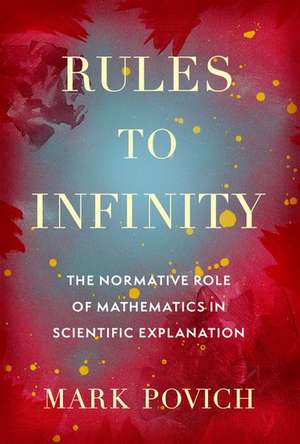Rules to Infinity: The Normative Role of Mathematics in Scientific Explanation
Autor Mark Povichen Limba Engleză Hardback – 11 feb 2025
Preț: 373.66 lei
Preț vechi: 512.33 lei
-27% Nou
Puncte Express: 560
Preț estimativ în valută:
71.51€ • 74.38$ • 59.03£
71.51€ • 74.38$ • 59.03£
Carte disponibilă
Livrare economică 14-20 martie
Preluare comenzi: 021 569.72.76
Specificații
ISBN-13: 9780197679005
ISBN-10: 0197679005
Pagini: 336
Dimensiuni: 168 x 237 x 27 mm
Greutate: 0.65 kg
Editura: Oxford University Press
Colecția OUP USA
Locul publicării:New York, United States
ISBN-10: 0197679005
Pagini: 336
Dimensiuni: 168 x 237 x 27 mm
Greutate: 0.65 kg
Editura: Oxford University Press
Colecția OUP USA
Locul publicării:New York, United States
Recenzii
An excellent book for anyone who wants to think seriously about how mathematical explanations work in science, and especially for those who think this may have important consequences for a Platonic view of mathematics.
Rules to Infinity is one of the most creative and insightful books written on the relationship between mathematics and scientific explanation in several decades. At a time when many philosophical discussions on these issues travel well-worn paths, Mark Povich's work charts a new and exciting course.
The kind of philosophy I like best involves connecting seemingly disparate ideas to solve a stubborn philosophical problem in an unexpected way. That is exactly what Mark Povich achieves. This is a wonderful contribution to the debate!
This book is essential reading for those working on scientific explanation, scientific representation and the metaphysical interpretation of pure mathematics.
Mark Povich's ontic conception of scientific explanation, combined with his deflationary conception of mathematics, has many attractive features, but also faces significant challenges. Povich offers vigorous arguments in defense of this combination, as well as incisive comparisons to rival accounts.
If you thought scientific explanations are made true by the facts, you might wonder what makes mathematical assertions true. Mark Povich provides a subtly defended and illuminating approach to these and related questions, bringing together topics that are often treated as orthogonal. The result is an important, timely, and most impressive book.
Rules to Infinity is one of the most creative and insightful books written on the relationship between mathematics and scientific explanation in several decades. At a time when many philosophical discussions on these issues travel well-worn paths, Mark Povich's work charts a new and exciting course.
The kind of philosophy I like best involves connecting seemingly disparate ideas to solve a stubborn philosophical problem in an unexpected way. That is exactly what Mark Povich achieves. This is a wonderful contribution to the debate!
This book is essential reading for those working on scientific explanation, scientific representation and the metaphysical interpretation of pure mathematics.
Mark Povich's ontic conception of scientific explanation, combined with his deflationary conception of mathematics, has many attractive features, but also faces significant challenges. Povich offers vigorous arguments in defense of this combination, as well as incisive comparisons to rival accounts.
If you thought scientific explanations are made true by the facts, you might wonder what makes mathematical assertions true. Mark Povich provides a subtly defended and illuminating approach to these and related questions, bringing together topics that are often treated as orthogonal. The result is an important, timely, and most impressive book.
Notă biografică
Mark Povich is Visiting Assistant Professor in Philosophy at University of Rochester. He has published articles in The British Journal for the Philosophy of Science, Erkenntnis, Mind, Philosophy of Science, Studies in History and Philosophy of Science Part A, Synthese, among others.
